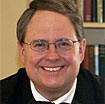Commentary on Mark 10:17-31
Former Texas Governor Ann Richards (1933-2006) once said, “You can put lipstick and earrings on a hog and call it Monique, but it’s still a pig.”
Read this Sunday’s Gospel lection. Meet Monique. But make it fast. I’m removing the Estée Lauder and Harry Winstons and going whole hog. It won’t be pretty.
Mentioned only four times in this Gospel (Mark 9:43, 45; 10:17, 30), “[eternal] life” is not one of Mark’s preoccupations, but it overlaps “the kingdom of God” (Mark 9:45; 10:23-25). Nor has the Old Testament much to say about eternal life (Proverbs 9:6; Job 19:25; Daniel 12:2). The concept of indestructible life, transcendent blessedness as God knows it, gathers steam in Jewish literature between the testaments (Wisdom of Solomon 5:15; 4 Maccabees 15:3; Psalms of Solomon 3:16). Second Maccabees 7:9 is representative: “The King of the universe will raise us up to an everlasting renewal of life, because we have died for his laws.”
Like Mark 10:30, some New Testament writings distinguish this life from that of future blessing (1 Thessalonians 2:19; 2 Timothy 2:10; Revelation 20:4-5); for others, the two converge (Colossians 3:3-4; 1 Timothy 6:12, 19; 2 Timothy 1:1). Especially in John is the latter true: “Anyone who hears my word and believes him who sent me has eternal life, and … has passed from death to life” (John 5:34 and sixteen other verses).
Unlike others in Mark (12:13-15), Jesus’ questioner in Mark 10:17 sounds sincere. Even though Jesus rebuffs the compliment (verse 18), “Good teacher” seems respectful, not sycophant. There’s no reason to suppose this man is disingenuous in claiming that he has kept God’s commandments all his life (verse 20; see Exodus 20:12-16 = Deuteronomy 5:16-20; Leviticus 19:3), to which Jesus selectively refers (Mark 10:19).
Jesus regards this fellow lovingly (Mark 10:21a): a unique reaction in this Gospel, reminiscent of his embracing little children (Mark 9:36; 10:16). Jesus’ countenance elicits a different visage: that of “one appalled [stygnasas], … mournfully [lypomenos]” (verse 22a, my translation). An honest conversation about communal faithfulness instantly turns funereal.
Why? Because the one thing this man lacks is the ability to accept Jesus’ directive: to divest his earnings as donations for the poor (verse 21a). Why? This fellow owned a lot (verse 22b). Instead of following Jesus, as invited (verse 21b), he walks away (verse 22a).
Peter insists that the Twelve have done what the rich man could not: they “have left everything and followed” Jesus (verse 28, see Mark 1:16-20). Unlike the disciples’ other protests (e.g., Mark 8:32b; 10:13), this one Jesus ratifies. Peter is solemnly assured (“Truly I tell you”) that whatever is relinquished “for my sake and for the sake of the good news” (see Mark 8:35) will be munificently reimbursed in kind (Mark 10:29b-30a). Their future recompense will be qualitatively superior: “in the age to come eternal life” (verse 30b)—the very thing Jesus’ questioner sought (Mark 10:17).
What is noteworthy in Jesus’ pledge of recompence for faithful disciples (Mark 10:29-30)?
- Fulfillment does await those who have left all to follow Jesus (also Mark 8:35b; 9:41; 13:13b, 27). Discipleship is hard, but it is not futile.
- Compared to those envisioned elsewhere in Jewish apocalypticism, the rewards promised in Mark are modest, lacking the grandeur of 2 Esdras’s seven orders of blessedness (2 Esdras 7:88-99) or Matthew’s vision of the Twelve enthroned as Israel’s judges (Matthew 19:28).
- Sacrifices and compensations are familial: “house or brothers or sisters or mother or father or children.” Those, like the Zebedee brothers (Mark 1:18-20) and Jesus himself (Mark 3:21, 31-33), who have suffered rupture from their families for the gospel’s sake will be reintegrated into other families that dispense with the supposedly indispensable member: a new father. In Jewish and Roman law extraordinary power was vested in the paterfamilias. In the new family promised by Jesus there is no such figure, because there is no place for such “great ones” who “are tyrants over” others (Mark 10:42-43a; see Matthew 23:9).
- While the age to come promises eternal life, in this age “persecutions” remain among the abundant rewards for sacrificial disciples (Mark 10:30).
Only in Mark 10:24 does Jesus address his disciples as tekna: children, like those whose approach to Jesus they had hindered (Mark 10:13). Mark asks us to ponder two absurd claims, cheek by jowl:
“Whoever does not receive the kingdom of God as a little child will never enter it” (Mark 10:15).
“How hard it will be for those who have wealth to enter the kingdom of God” (Mark 10:23).
A child lacks that power of the rich to make things happen. In the subversive economy of God’s kingdom, the child’s advantage is the helplessness to do what only God can do for it (Mark 10:27). While gaining the whole world (Mark 8:36), the man with possessions becomes incapacitated: because they possess him, he forfeits the eternal life he seeks (Mark 10:17; see Mark 4:18-19).
Only a camel can be threaded through a needle’s eye, only the helpless can enter eternal life, because things divine, not human, propel God’s kingdom (Mark 8:33b): “For mortals it is impossible, but not for God; for God all things are possible” (Mark 10:27). So, it follows: “Many who are first will be last, and the last will be first” (Mark 10:31).
The problem with dismissing Jesus’ teaching as utopian is its actual practice in real life. For 29 years Agnes Gonxha Bojaxhiu (1910-1997) ministered to the poorest of Calcutta’s poor. Under a new name, Mother Teresa, she began in 1948 with a one-dollar sari, no funds, and persistent begging for food and medical supplies. By the 1960s Pope Paul VI gave her a limousine, which she raffled for her Missionaries of Charity. Accepting the Nobel Peace Prize in 1978, she refused its gift and gala, redirecting Oslo’s $192,000 to relieve India’s poor. When the Nobel Committee asked her what others should do to promote peace, she replied, “Go home and love your family.”
Some among your listeners will walk away from this. That happened to Christ. Beside Mark, you speak for those who stake Mother Teresa’s claim: “As to my heart, I belong entirely to the Heart of Jesus.”
PRAYER OF THE DAY
Lord of abundant riches, when asked to give everything to follow Jesus, a rich man faltered. Give us the courage to give everything that we have to you, knowing that what you offer is more valuable than all the riches in the world. Amen.
HYMNS
Jesus calls us; o’er the tumult ELW 696, GG 720, H82 549/550, UMH 398, NCH 171/172
The glory of these forty days ELW 320, GG 165, H82 143
CHORAL
Lord, whose love in humble service, Cathy Moklebust (handbells)


March 1, 2020